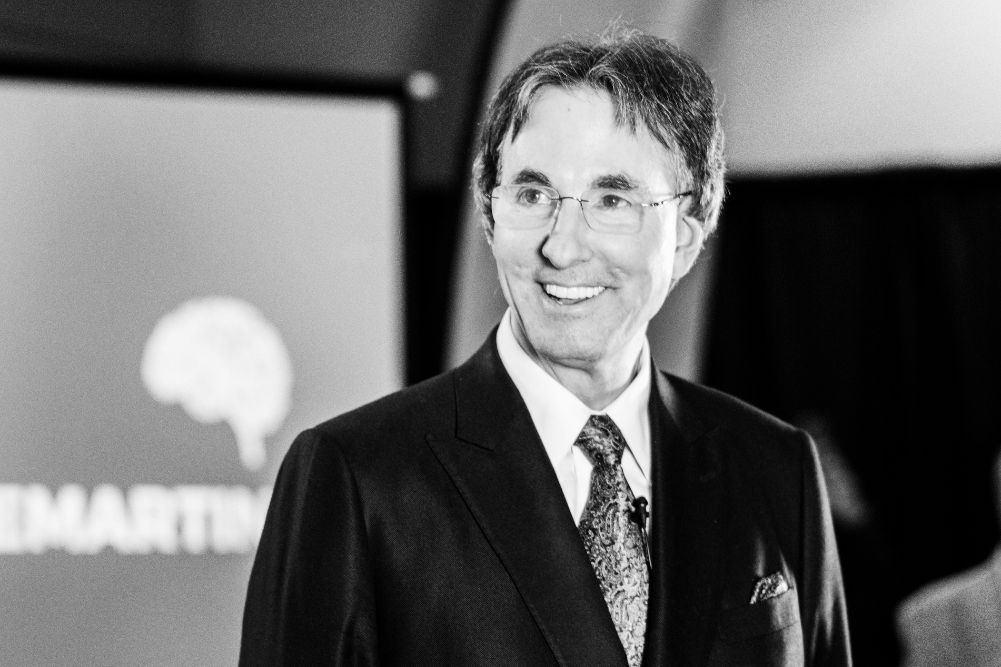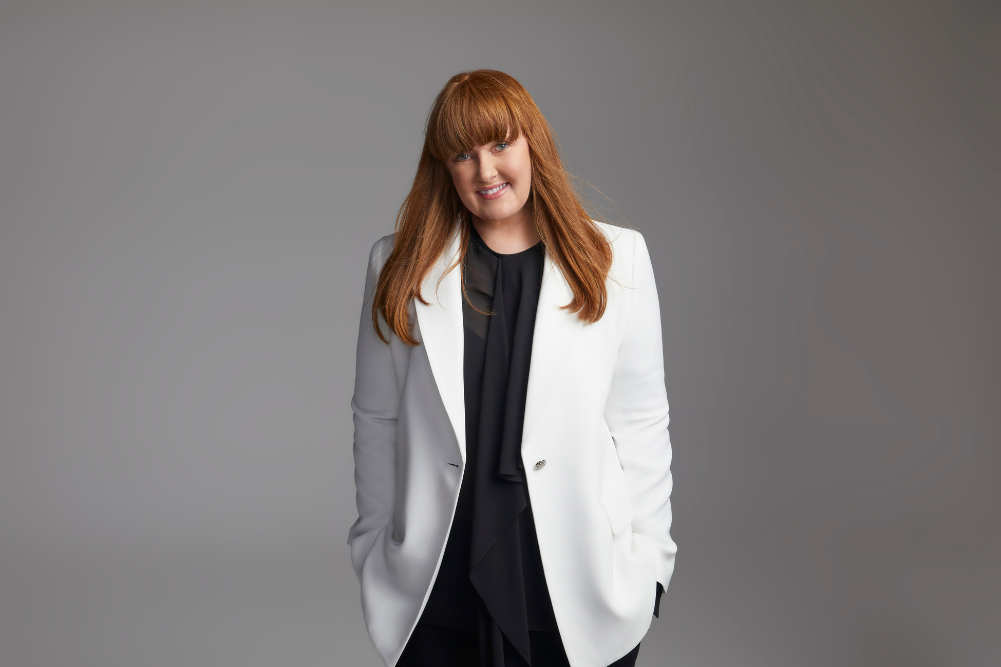Living an Inspired Life
From dyslexic dropout to top human behavior expert, Dr. Demartini’s journey proves it’s never too late to shine.
“I tell people give yourself permission to shine and be your unique self. That’s how you make a difference,” says Dr John Demartini. “You don’t make a difference fitting in. You make a difference standing out.”
It’s fair to say Demartini has made a difference by standing out. The American world‑renowned human behaviour specialist, writer, researcher and speaker is the author of more than 40 self‑development books, the most popular of which have been translated into 36 languages, and hosts an array of online personal development courses.
Demartini’s key teachings are on how to live a more inspired life. He shares insights on his podcast The Demartini Show and has been featured in documentaries including The Secret, the 2006 film that propelled the “law of attraction” — the idea that positive thinking can manifest positive outcomes in one’s life — into the mainstream.
At 70 years old, Demartini is a highly in‑demand speaker. He delivers up to 400 presentations each year and has addressed audiences of up to 11,000 people. The Breakthrough Experience, his two‑day seminar program which focuses on breaking through limitations to reach your goals, has been delivered to more than 150,000 students globally.
The class dunce
Demartini’s early years are not what you’d expect for someone as successful as he is now. Born in Texas, Demartini had leg and hand deformities and wore braces on his legs as a child. He struggled at school due to having a speech impediment and dyslexia and was unable to read properly until he was 18 years old.
“I only made it through elementary school by asking the smartest kids questions,” Demartini recalls. At a time when learning difficulties were not as widely understood as they are now, Demartini was put into the lowest reading groups and eventually his first‑grade teacher gave him the humiliation of wearing the “dunce” cap — a hat used as a form of punishment or humiliation in schools.
“She finally had my parents come to the class and said, ‘I’m afraid your son is not going to be able to read or write properly,’” says Demartini. “‘And I’m afraid he’s not going to amount to anything or go very far in life and will not be able to speak properly.’”
Wave of change
Internalising his teacher’s words, Demartini eventually dropped out of school at 14. Seeking the surfer lifestyle, he hitchhiked to California, before heading to Hawaii alone at 15, expecting a nomadic life of making surfboards and picking up odd jobs for a living.
It was a near‑death experience that led him to meet the person who would inspire him to turn his life around — nutritionist and health‑food store pioneer Paul Bragg.
Demartini got strychnine and cyanide poisoning at age 17 from the plants he was consuming in Hawaii. “I was surfing on a big wave and my diaphragm stopped. I luckily got some air and survived it, but I was pretty well unconscious for three days,” says Demartini. As part of his recovery, Demartini became a regular at a nearby health‑food store, where Bragg was hosting a guest lecture.
Bragg led the group through a guided meditation where Demartini saw a vision of the life he wanted. “I saw myself walking through an archway and onto a balcony about 40 feet up in front of a giant square with a million people in it, and I was speaking. It was just a mental image, but I got tears in my eyes … I just thought, this is what I want to do. I want to be able to be heard. I want to be able to communicate. I want to be able to say something intelligent, something that would mean something to somebody, and that somebody would be benefited by that.”
Bragg’s words opened Demartini’s mind to new possibilities. “He said, ‘What you think about, what you visualise, what you affirm, what you feel, what you write, what you take actions on becomes your life,’” recalls Demartini.
This newfound mindset, that he did have control over his future, motivated him to go back to school in Texas. “Everything I was told I would never be able to do became the thing that I wanted to excel at,” says Demartini.
The power of reading
After returning to school, Demartini recalls passing his GED (high school exams) by simply guessing the answers. But he wasn’t so lucky when he took exams at a junior college. He was devastated to discover that his marks were not only a failure but bottom of the class by a huge margin.
“I almost burst into tears. I ran to my car, and I kind of sunk in my car, and I just cried,” he says. “I heard my first‑grade teacher talking. ‘I’m afraid your son will never be able to read or write or communicate, never amount to a thing, never go very far in life. You better put him into sports or something.’”
When he got home, his mother comforted him and told him that whatever he would become in life — a teacher, a philosopher, a surfer or a panhandler — she would love him no matter what. This gave him a burst of inspiration to make changes.
“My hand went into a determined fist, I saw the [meditation] vision in my mind and I said to myself — I’m going to master this thing called reading and studying and learning,” says Demartini. “I’m going to master this thing called teaching, healing and philosophy, and I’m going to do whatever it takes.”
With focus and determination, Demartini opened a dictionary and started learning 30 new words a day. His mum tested him on spelling and understanding. “I grew my vocabulary by 20,000 words over the next two years, and I went from the bottom of the class to the top of the class,” says Demartini. “I read eight complete sets of encyclopaedias, anything to grow my vocabulary, anything to grow my knowledge, to catch up with the other kids.”
After spending his early school years asking the smart kids questions to get by, Demartini had transformed into the one that others were coming to with questions. “By the time I went to the University of Houston a couple years later, I had 150, sometimes 400, students under the trees every day asking questions and I was teaching.”
“I was reading four to seven books a day, and I was devouring that and then sharing whatever I was reading on many topics. It wasn’t only about health. It was on philosophy. It was on the mastery of life and how to grow your business, how to grow your wealth and how to stabilise relationships.”
Today, Demartini says he has read more than 31,000 books. When asked if he could recommend just one book, he doesn’t hesitate — A Syntopicon: An Index to The Great Ideas, a two‑volume set by Mortimer Adler. “It covers the most significant questions that the greatest minds in the last 3000 years have asked, summarised,” says Demartini.
Values: your internal compass
After amassing his knowledge, Demartini continued his teaching journey by giving talks to local health professionals, then on radio and TV, and soon he was speaking at state conferences, national meetings and even to global audiences.
Those who follow Demartini and his teachings are all from different walks of life. Yet they have one thing in common, they’re searching for deeper fulfilment in life, whether that’s in their career, relationships, personal development or finances.
One of the pillars that underpins his teachings is the concept of values, which he thinks is one of the most important drivers of human behaviour. “Every human being — regardless of age, gender, culture — lives moment by moment by a set of priorities, a unique fingerprint, a specific set of values,” says Demartini. “Whatever’s highest on that list of values in their life — in my case, teaching — you spontaneously are inspired to do it.”
Demartini teaches that, when you are looking for a sense of purpose, it can be found in what your highest value is, not what you think it should be. These values are not social idealisms like honesty and kindness. Instead, they are specific areas of life that are most important to you, this could be family, career, travel, creativity, learning or health.
Demartini has a quiz on his website to help people uncover their highest values, the outcome of which he says often surprises people. He says that setting goals that are aligned with your values can help influence your decisions and guide you towards the people, jobs and situations that will most fulfil you. By identifying and understanding how your goals relate to your highest value, you can reframe seemingly mundane tasks into something meaningful and fulfilling.
In his book The Values Factor, Demartini writes about one of his clients, a doctor who put a high value on learning and on healing his patients. He spent all his money on books and seminars in the belief that it would make him a better doctor, at the expense of his family’s finances and happiness. Bills were left unpaid with no savings for a family vacation and no future college fund for his children.
Demartini helped his client relate his highest value, healing others, to his much‑needed goal of wealth building. “I helped him see that creating financial independence would actually free him to focus on his patients without having to worry about his wife and children,” Demartini writes. Through brainstorming more cost‑effective ways to gain knowledge such as utilising libraries and making smart investments, Demartini helped the man see that being financially responsible would not only help his family but would give him more influence and prestige among other doctors. It might even allow him to fund research or clinics. Demartini helped him understand that generating wealth would ultimately increase his opportunities to do what he valued most — heal patients. Within months, the doctor’s financial situation had completely transformed.
A legacy of impact
Despite now being in his 70s, Demartini doesn’t plan to slow down his work anytime soon and is inspired by the endless stream of messages he receives. He opens a document on his computer and scrolls through many pages of thankyou letters from people who say his teachings have helped them discover their true values and pursue the life they want.
One story that stands out for him was a man Demartini met and worked with more than a decade ago. “He was a struggling musician and artist,” recalls Demartini. “He’s got three Grammys today. When I hear that, I’m brought to tears.”
Demartini has also spoken in schools, teaching about how to live an inspired and value‑driven life. While working with dyslexic people is not an area he focuses on, he has met young people who relate to the struggles that he had as a young man. Many had learning difficulties and felt like they wouldn’t achieve anything significant.
“I have had the opportunity to [meet] many people that remind me of me when I was young, in my classes. Many of them have had tears in their eyes and believe that they could do more with their life because of the talk I did,” says Demartini. “I certainly know that … they saw new possibilities, and that meant the world.”
Reflecting on his life, Demartini never forgot how much of an impact Paul Bragg made on him and how Bragg’s words inspired him to completely change his life. It was a comment from Bragg’s daughter, Patricia, that helped Demartini realise that perhaps he was having as big an impact on others as Bragg had on him. “[Patricia] attended my program in Hawaii and came up to me during a break,” Demartini recalls. “She looked into my eyes and said, ‘You remind me of my father’. That was a very inspiring moment.”
While Demartini no longer panhandles or hitchhikes, he never lost his love for a nomadic lifestyle — it’s just much more luxurious now. He once owned many properties but now lives aboard a luxury ship which sails around the globe and is aptly named The World. It’s not a bad life for someone who’s first‑grade teacher suggested he’d amount to nothing.
Looking ahead, he plans to remain empowered in all areas of his life, such as continuing to study and learn, maintain vitality and movement, travel the world with his “global family” and continue to inspire others through his teachings. “I wanted to exemplify that in my own life and show what was possible … because if I do that, it helps other people,” says Demartini. “You living an inspired life, and overcoming [challenges], is more significant than just talking about it. “To put your life together, integrate it and have mastery over all areas of your life, that’s wellbeing. That’s wellness.”








